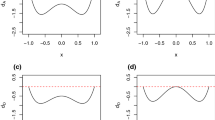Abstract
Besides requiring a good fit of the learned model to the empirical data, machine learning problems usually require such a model to satisfy additional constraints. Their satisfaction can be either imposed a-priori, or checked a-posteriori, once the optimal solution to the learning problem has been determined. In this framework, it is proved in the paper that the optimal solutions to several batch and online regression problems (specifically, the Ordinary Least Squares, Tikhonov regularization, and Kalman filtering problems) satisfy, under certain conditions, either symmetry or antisymmetry constraints, where the symmetry/antisymmetry is defined with respect to a suitable transformation of the data. Computational issues related to the obtained theoretical results (i.e., reduction of the dimensions of the matrices involved in the computations of the optimal solutions) are also described. The results, which are validated numerically, have potential application in machine-learning problems such as pairwise binary classification, learning of preference relations, and learning the weights associated with the directed arcs of a graph under symmetry/antisymmetry constraints.
Similar content being viewed by others
Notes
Its particular expressions reported in Assumption 4.1 follow by imposing, respectively, \(\bar{\mathbf {w}}^{(2)}=\bar{\mathbf {w}}^{(1)}\) in the symmetric case, and \(\bar{\mathbf {w}}^{(2)}=-\bar{\mathbf {w}}^{(1)}\) in the antisymmetric case.
References
Diligenti, M., Gori, M., Maggini, M., Rigutini, L.: Bridging logic and kernel machines. Mach. Learn. 86, 57–88 (2012)
Gnecco, G., Gori, M., Melacci, S., Sanguineti, M.: A theoretical framework for supervised learning from regions. Neurocomputing 129, 25–32 (2014)
Gnecco, G., Gori, M., Melacci, S., Sanguineti, M.: Foundations of support constraint machines. Neural Comput. 27, 388–480 (2015)
Gnecco, G., Gori, M., Melacci, S., Sanguineti, M.: Learning with mixed hard/soft pointwise constraints. IEEE Trans. Neural Netw. Learn. Syst. 26, 2019–2032 (2015)
Gnecco, G., Gori, M., Sanguineti, M.: Learning with boundary conditions. Neural Comput. 25, 1029–1106 (2013)
Kashima, H., Oyama, S., Yamanishi, Y., Tsuda, K.: On pairwise kernels: an efficient alternative and generalization analysis. In: Advances in Knowledge Discovery and Data Mining. Lecture Notes in Artificial Intelligence, vol. 5476, pp. 1030–1037. Springer (2009)
Herbrich, R., Graepel, T., Bollmann-Sdorra, P., Obermayer, K.: Supervised learning of preference relations. In: Proceedings Fachgruppentreffen Maschinelles Lernen, pp. 43–47 (1998)
Brunner, C., Fischer, A., Luig, K., Thies, T.: Pairwise support vector machines and their application to large scale problems. J. Mach. Learn. Res. 13, 2279–2292 (2012)
Pahikkala, T., Tsivtsivadze, E., Airola, A., Järvinen, J., Boberg, J.: An efficient algorithm for learning to rank from preference graphs. Mach. Learn. 75, 129–165 (2009)
Pahikkala, T., Airola, A., Stock, M., De Baets, B., Waegeman, W.: Efficient regularized least-squares algorithms for conditional ranking on relational data. Mach. Learn. 93, 321–356 (2013)
Dardard, F., Gnecco, G., Glowinski, D.: Automatic classification of leading interactions in a string quartet. ACM Trans. Interact. Intell. Syst. (2015). doi:10.1145/2818739
Vedaldi, A., Blaschko, M., Zisserman, A.: Learning equivariant structured output SVM regressors. In: Proceedings of the 2011 IEEE International Conference on Computer Vision (ICCV), pp. 959–966. IEEE (2011)
Pahikkala, T., Viljanen, M., Airola, A., Waegeman, W.: Spectral analysis of symmetric and anti-symmetric pairwise kernels. arXiv:1506.05950v1 [cs.LG] 19 Jun 2015 (2015)
Golub, G.H., Van Loan, C.F.: Matrix Computations. John Hopkins University Press, London, UK (1996)
Barata, J.C.A., Hussein, M.S.: The Moore-Penrose pseudoinverse: a tutorial review of the theory. Braz. J. Phys. 42, 146–165 (2012)
Bertsekas, D. P.: Dynamic Programming and Optimal Control, vo. 1. Athena Scientific, Nashua, NH, USA (1995)
Horn, R. A., Zhang, F.: Basic properties of the Schur complement. In: Zhang, F., (ed.) The Schur Complement and Its Applications. Springer, New York, NY, USA (2005)
Liu, W., Park, I., Wang, Y., Príncipe, J.C.: Extended kernel recursive least squares algorithm. IEEE Trans. Signal Process. 57, 3801–3814 (2009)
Author information
Authors and Affiliations
Corresponding author
Rights and permissions
About this article
Cite this article
Gnecco, G. Symmetry and antisymmetry properties of optimal solutions to regression problems. Optim Lett 11, 1427–1442 (2017). https://doi.org/10.1007/s11590-016-1101-x
Received:
Accepted:
Published:
Issue Date:
DOI: https://doi.org/10.1007/s11590-016-1101-x




